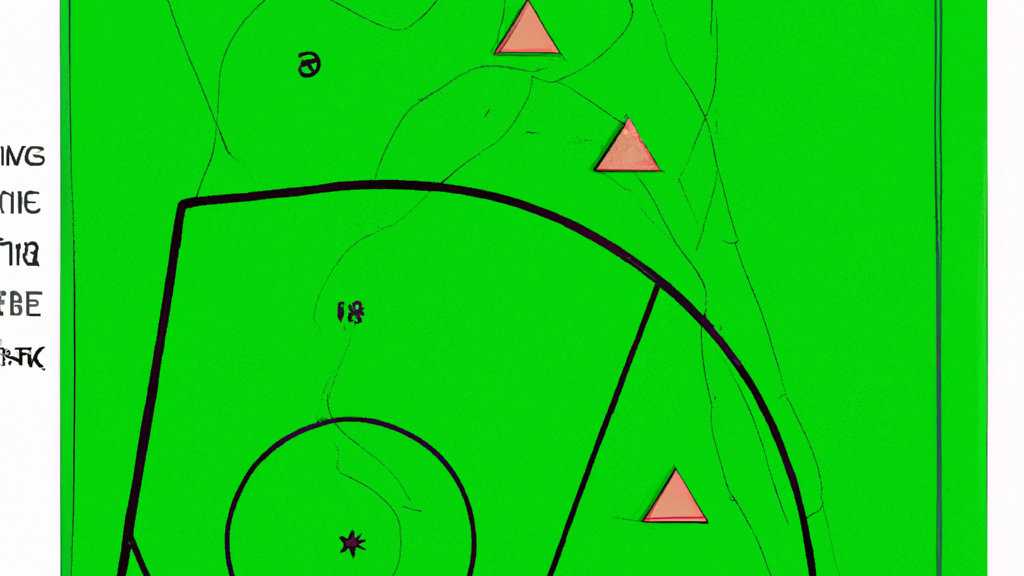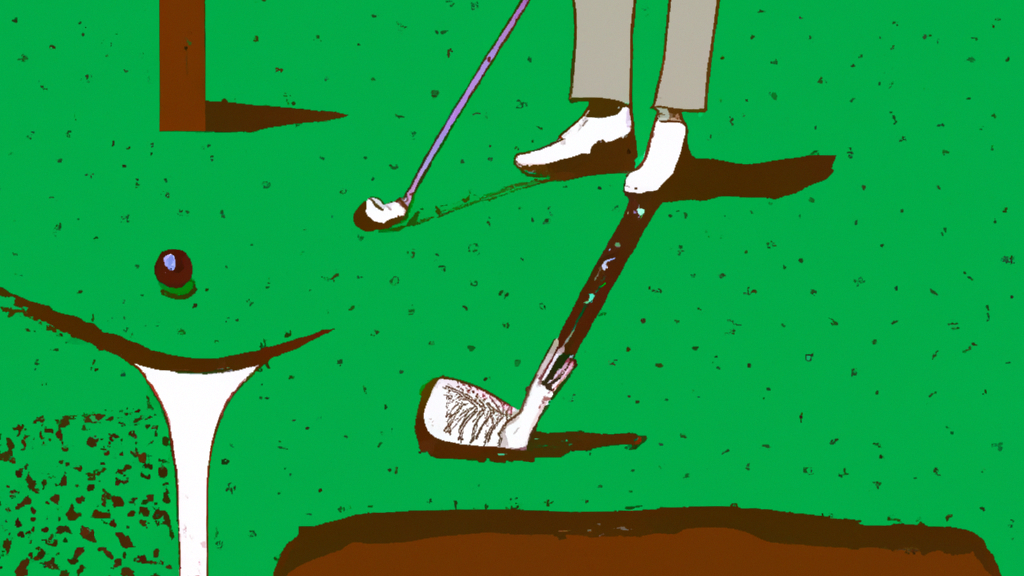THE PSYCHOLOGY OF GOLFING: DEALING WITH PRESSURE AND NERVES ON THE COURSE
Golf is a game that requires a great deal of mental fortitude and focus. It’s not just about hitting the ball, but also about managing your emotions and dealing with the pressure and nerves that come with playing on the course. The psychology of golfing is a fascinating topic that has been studied extensively by sports psychologists and golf professionals alike. In this article, we will explore the various techniques and strategies that can help golfers deal with pressure and nerves on the course.
Whether you’re a seasoned pro or a beginner, understanding the psychology of golfing can help you improve your game and enjoy the sport even more. So, let’s dive in and explore the fascinating world of golf psychology!

THE PSYCHOLOGY OF GOLFING: DEALING WITH PRESSURE AND NERVES ON THE COURSE
Golf is a game that requires a great deal of mental focus and concentration. It is a sport that can be both exhilarating and frustrating, and it is not uncommon for golfers to experience pressure and nerves on the course. Whether you are a beginner or a seasoned pro, dealing with the psychological aspects of golfing can be a challenge. In this article, we will explore the psychology of golfing and provide tips for dealing with pressure and nerves on the course.
The Mental Game of Golf
Golf is often referred to as a mental game, and for good reason. The ability to stay focused and maintain a positive attitude is essential for success on the course. Golfers must be able to manage their emotions and deal with the pressure of competition. The mental game of golf is just as important as the physical game, and it is something that all golfers must master if they want to improve their performance.
One of the biggest challenges that golfers face is dealing with pressure and nerves on the course. Whether it is the pressure of a big tournament or the nerves that come with playing in front of a large crowd, golfers must be able to manage their emotions and stay focused on their game. The key to dealing with pressure and nerves is to develop a mental game plan that will help you stay calm and focused under pressure.
Developing a Mental Game Plan
Developing a mental game plan is essential for golfers who want to improve their performance on the course. A mental game plan is a set of strategies and techniques that golfers can use to manage their emotions and stay focused on their game. Here are some tips for developing a mental game plan:
- Set Goals: Setting goals is an important part of developing a mental game plan. Golfers should set both short-term and long-term goals that are specific, measurable, and achievable. Setting goals will help golfers stay focused and motivated, and it will give them a sense of direction and purpose.
- Visualize Success: Visualization is a powerful tool that golfers can use to manage their emotions and stay focused on their game. Golfers should visualize themselves hitting successful shots and achieving their goals. Visualization can help golfers stay positive and confident, even in the face of pressure and nerves.
- Stay Positive: Maintaining a positive attitude is essential for success on the course. Golfers should focus on their strengths and accomplishments, rather than their weaknesses and mistakes. Staying positive will help golfers stay motivated and focused, even when things are not going well.
- Manage Emotions: Managing emotions is a key part of developing a mental game plan. Golfers should learn to recognize their emotions and manage them in a positive way. For example, if a golfer is feeling nervous, they can use deep breathing techniques to calm themselves down.
- Focus on the Process: Focusing on the process is essential for success on the course. Golfers should focus on their pre-shot routine and their swing mechanics, rather than the outcome of the shot. Focusing on the process will help golfers stay in the moment and stay focused on their game.
Dealing with Pressure and Nerves on the Course
Dealing with pressure and nerves on the course is a challenge that all golfers must face. Whether it is the pressure of a big tournament or the nerves that come with playing in front of a large crowd, golfers must be able to manage their emotions and stay focused on their game. Here are some tips for dealing with pressure and nerves on the course:
- Prepare Mentally: Preparation is key when it comes to dealing with pressure and nerves on the course. Golfers should prepare mentally by visualizing success, setting goals, and developing a mental game plan. Mental preparation will help golfers stay focused and confident, even in the face of pressure and nerves.
- Stay Positive: Maintaining a positive attitude is essential for dealing with pressure and nerves on the course. Golfers should focus on their strengths and accomplishments, rather than their weaknesses and mistakes. Staying positive will help golfers stay motivated and focused, even when things are not going well.
- Use Deep Breathing Techniques: Deep breathing techniques can help golfers calm their nerves and manage their emotions. Golfers should take deep breaths before each shot to help them stay calm and focused.
- Focus on the Process: Focusing on the process is essential for dealing with pressure and nerves on the course. Golfers should focus on their pre-shot routine and their swing mechanics, rather than the outcome of the shot. Focusing on the process will help golfers stay in the moment and stay focused on their game.
- Stay in the Present Moment: Staying in the present moment is essential for dealing with pressure and nerves on the course. Golfers should focus on the shot at hand, rather than worrying about the future or dwelling on the past. Staying in the present moment will help golfers stay focused and calm under pressure.
Conclusion
The psychology of golfing is a complex and challenging aspect of the game. Dealing with pressure and nerves on the course is a challenge that all golfers must face. Developing a mental game plan and using techniques such as visualization, deep breathing, and staying positive can help golfers manage their emotions and stay focused on their game. By mastering the mental game of golf, golfers can improve their performance on the course and achieve their goals.

- 5 Tips for Calming Your Nerves on the Golf Course
5 Tips for Calming Your Nerves on the Golf Course · 1. Chew Gum. There have been a number of studies done on the effects of chewing gum on the brain. · 2. Take … - Golfers Nerves: 5 Ways To Beat Them And Shoot Lower Scores …
Jun 9, 2017 … Whenever you start to feel nervous on the golf course, you should … as a coping mechanism for stress by medical professionals and other … - 7 Tips to crush nerves and play your best golf under pressure …
Jul 30, 2014 … 7 Tips to crush nerves and play your best golf under pressure · 1. Be prepared. Before every competition, be prepared. · 2. Stick to your routine. - How to Deal with Nerves on the Golf Course
1. My mind defaults to the negative between shots and standing over shots. · 2.Committing to a specific routine for putting has helped me. · 3. There is a fine … - Mental Game of Golf: 5 Ways To Play Better Golf Under Pressure
May 13, 2015 … Whatever your level of play, I’m sure you’ve experienced the feeling of playing under pressure on the golf course. How you cope with it can … - Overcome Golf Anxiety – Remedy Nervousness on the Golf Course
Jun 13, 2022 … How to Overcome Anxiety & Nervousness on the Golf Course · Stress response and golf anxiety · The key to overcoming golf anxiety · 1. Increase your … - 4 Ways To Overcome Nervousness On The Golf Course
Feb 15, 2020 … Breathe and slow down when golfing. Consistent breathing is one of the best techniques to overcoming nervousness on the golf course. Take long, … - How to Calm Your Nerves on the Golf Course – Practical Golf
The way to activate your Vagus nerve and switch from your tense state to a more relaxed one is to start controlled, deep breathing. It’s as simple as inhaling … - Calming Those Nerves When the Pressure Is On – The Captains Golf …
Jun 9, 2022 … Every golfer, whether professional or amateur, has been forced to deal with it on the course. It’s called nerves. Perhaps the match is … - How to Manage Pre-Tournament Nerves and Pressure – IJGA
Nov 28, 2017 … Most if not all of us have experienced nerves and pressure at one time or … Be Prepared – Play the golf course during a practice round.
Fun facts about The Psychology of Golfing: Dealing with Pressure and Nerves on the Course
- Golf was first played in Scotland in the 15th century, but it wasn’t until the late 19th and early 20th centuries that it became popular in America.
- The Masters Tournament, one of golf’s four major championships, has been held annually at Augusta National Golf Club since its inception in 1934.
- Professional golfer Tiger Woods is widely considered one of the greatest players of all time, having won a total of 82 PGA Tour events and numerous major championships throughout his career.
- The Ryder Cup is a biennial team competition between golfers from Europe and the United States that dates back to 1927.
- Many country clubs have strict dress codes for members and guests alike; for example, men may be required to wear collared shirts while women must wear skirts or shorts that are no shorter than a certain length.
- In addition to traditional stroke play tournaments where players compete against each other based on their total number of strokes over several rounds, there are also match play tournaments where players compete head-to-head against each other on individual holes or sets of holes.
- Some professional golfers use sports psychologists to help them manage stress and anxiety on the course; others rely on meditation techniques or visualization exercises to stay focused during competition.
- Golf courses can vary widely depending on their location; some courses are built into hilly terrain with lots of elevation changes while others are flat with few obstacles besides sand traps and water hazards





